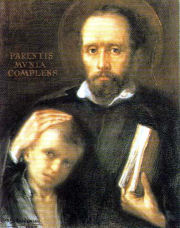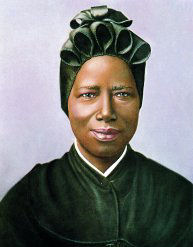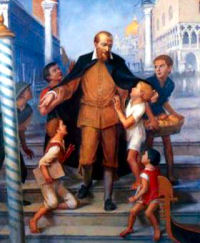Ordinary Time: February 8th
Optional Memorials of St. Jerome Emiliani, priest; St. Josephine Bakhita, virgin
» Enjoy our Liturgical Seasons series of e-books!
St. Jerome Emiliani was born in Venice in 1486. He converted to Christianity after a rather dissolute youth, and dedicated himself to the service of the poor, the sick, and abandoned children. He founded a congregation (Somaschi) which looked after the education of children, especially orphans. He died of the plague while serving the afflicted.
Saint Josephine was a young Sudanese girl sold into slavery and brought to Italy where, while serving as a nanny, she was sent to live with the Canossian Sisters of the Institute of the Catechumens in Venice. There she was baptized, and, having reached majority age, was granted her freedom by Italian law. In 1896 she joined the Canossian Daughters of Charity where she served humbly for the next twenty five years. She died after a long and painful illness, during which she would cry out to the Lord: "Please loosen the chains... they are so heavy!" Her dying words were "Our Lady! Our Lady!"
According to the 1962 Missal of Bl. John XXIII the Extraordinary Form of the Roman Rite, today is the feast of St. John of Matha, who came from Provence, France and was ordained a priest in Paris. He retired to a solitary life conscious that God was calling him to a special mission, and spent three years in prayer and recollection. He then founded the Trinitarian Order for the ransom of Christians held by the Mohammedans. A great number of houses were founded and innumerable prisoners set free. St. John spent the last two years of his life in Rome, where he died.
St. Jerome Emiliani
 A careless and irreligious soldier for the city-state of Venice, Jerome was captured in a skirmish at an outpost town and chained in a dungeon. In prison Jerome had a lot of time to think, and he gradually learned how to pray. When he escaped, he returned to Venice where he took charge of the education of his nephews—and began his own studies for the priesthood.
A careless and irreligious soldier for the city-state of Venice, Jerome was captured in a skirmish at an outpost town and chained in a dungeon. In prison Jerome had a lot of time to think, and he gradually learned how to pray. When he escaped, he returned to Venice where he took charge of the education of his nephews—and began his own studies for the priesthood.
In the years after his ordination, events again called Jerome to a decision and a new lifestyle. Plague and famine swept northern Italy. Jerome began caring for the sick and feeding the hungry at his own expense. While serving the sick and the poor, he soon resolved to devote himself and his property solely to others, particularly to abandoned children. He founded three orphanages, a shelter for penitent prostitutes and a hospital.
Around 1532 Jerome and two other priests established a congregation dedicated to the care of orphans and the education of youth. Jerome died in 1537 from a disease he caught while tending the sick. He was canonized in 1767. In 1928 Pius XI named him the universal patron of orphans and abandoned children.
—Excerpted from Saint of the Day, Leonard Foley, O.F.M.
Patronage: Abandoned people; orphans; Venice, Italy
Symbols and Representation: Ball and chain; man shackled with a ball and chain who is attending the sick; man wearing a ball and chain, and receiving an apparition of Mary and the Child Jesus.
Highlights and Things to Do:
- Read more about St. Jerome:
- Meditate on these words: "Before dying, Jerome gives to his own a testament that is not only the synthesis of his spiritual experience, but also an itinerary of Christian life: Follow the way of the Crucified, despise the world, love one another, serve the poor. The life of love for the poor is born from a community of people who live the commandment of the reciprocal love, after having decided to have, as a goal, only God. The cross becomes the expression of this dedication and love, on the example of Jesus Christ."
- The religious order that St. Jerome founded, the Company of the Servants of the Poor or Somascan Fathers and Brothers is still functioning. See their website for St. Jerome's letters written in 1535 and you can also learn more about this religious community.
- See the Founder's Statue of St. Jerome at St. Peter's Basilica.
St. Josephine Bakhita
 For many years, Josephine Bakhita was a slave, but her spirit was always free and eventually that spirit prevailed. Born in Olgossa in the Darfur region of southern Sudan, Josephine was kidnapped at the age of seven, sold into slavery and given the name Bakhita, which means fortunate. She was resold several times, finally in 1883 to Callisto Legnani, Italian consul in Khartoum, Sudan.
For many years, Josephine Bakhita was a slave, but her spirit was always free and eventually that spirit prevailed. Born in Olgossa in the Darfur region of southern Sudan, Josephine was kidnapped at the age of seven, sold into slavery and given the name Bakhita, which means fortunate. She was resold several times, finally in 1883 to Callisto Legnani, Italian consul in Khartoum, Sudan.
Two years later he took Josephine to Italy and gave her to his friend Augusto Michieli. Soon Bakhita became babysitter to Mimmina Michieli, whom she accompanied to Venice's Institute of the Catechumens, run by the Canossian Sisters. While Mimmina was being instructed, Josephine felt drawn to the Catholic Church. She was baptized and confirmed in 1890, taking the name Josephine.
When the Michielis returned from Africa and wanted to take Mimmina and Josephine back with them, the future saint refused to go. During the ensuing court case, the Canossian sisters and the patriarch of Venice intervened on Josephine's behalf. The judge concluded that since slavery was illegal in Italy, she had actually been free since 1885.
Josephine entered the Institute of Saint Magdalene of Canossa in 1893 and made her profession three years later. In 1902, she was transferred to the city of Schio (northeast of Verona), where she assisted her religious community through cooking, sewing, embroidery and welcoming visitors at the door. She soon became well loved by the children attending the sisters' school and the local citizens. She once said, "Be good, love the Lord, pray for those who do not know Him. What a great grace it is to know God!"
The first steps toward her beatification began in 1959. She was beatified in 1992 and canonized eight years later.
—Excerpted from Saint of the Day, Leonard Foley, O.F.M.
"Be good, love the Lord, pray for those who do not know him. What a great grace it is to know God!". —St. Josephine Bakhita
Patronage: Sudan
Her Name Means: the lucky one; fortunate ( = bakhita); whom the Lord adds (Joseph)
Highlights and Things to Do:
- Visit these websites for more about the life of St. Josephine:
- Vatican
- Afrol.com (Has links to information about the Faith in Africa and the persecution which continues)
- Saints Stories for All Ages
- CNA 1
- CNA 2
- Catholic Fire
- CatholicSaints.info
- The Canossian Daughters of Charity are called to contemplate, experience and share God's love for every person and to participate in Christ's mission of salvation in a life of total dedication to God, communion and humble service with Mary, mother of love beneath the cross. Learn more about the Canossian Daughters of Charity, the order in which St. Josephine became a professed religious.
- A Sister seeing St. Josephine so peaceful and always in prayer, asked, "Do you wish to go to heaven?" "I wish neither to go nor to stay. God knows where to find me, when He wants me." To another who asked how she was going on, she answered, "I am going slowly, step by step, because I have two heavy bags to carry—one containing my own sins, the other Christ's merits. When I get to the other side, I will open my bags and say, 'Eternal Father, now judge!' and to St Peter, 'You can close that door of yours, for I'm going to stay.'"
- Pray for those suffering persecution in Sudan. Read what Bishop Macram Max Gassis says in this article, Sudan: Country of Terrorism, Religious Persecution, Slavery, Rape, Genocide, and Man-Made Starvation and this statement from the Sudan Catholic Bishops' Regional Conference.
- St. Josephine's relics are in Church of the Holy Family of the Canossian convent of Schio, Italy.
- See Catholic Cuisine for some African inspired recipes for St. Josephine.






